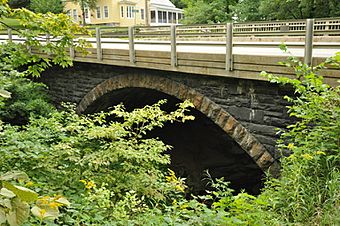Colburn Bridge facts for kids
Quick facts for kids |
|
|
Colburn Bridge
|
|
 |
|
| Location | |
|---|---|
| Area | less than one acre |
| Built | 1899 |
| Architectural style | Masonry arch bridge |
| MPS | Metal Truss, Masonry, and Concrete Bridges in Vermont MPS |
| NRHP reference No. | 90001493 |
| Added to NRHP | October 11, 1990 |
The Colburn Bridge is a really old and important bridge in Pittsford, Vermont. It's a special kind of bridge called a masonry arch bridge, which means it's built from stones and has a curved arch shape. This bridge carries U.S. Route 7 (a big road) over a small stream called Sugar Hollow Brook. It was built way back in 1899 and is known for its excellent craftsmanship. Because it's so old and well-built, it was added to the National Register of Historic Places in 1990.
About the Colburn Bridge
The Colburn Bridge is found about 0.5 miles (0.8 km) east of Pittsford's town center. It sits on US 7, which is a main road in western Vermont. The bridge crosses a small valley made by Sugar Hollow Brook. This brook flows south.
How the Bridge Looks
The bridge is made of a single stone arch. It is about 46 feet (14 m) long and 39 feet (12 m) wide. The arch is shaped like a half-circle. Its curve is between 20 to 25 feet (6.1 to 7.6 m) wide.
The base of the bridge is made from rough-cut limestone blocks. The special wedge-shaped stones that form the arch (called voussoirs) are cut a bit more smoothly. The parts of the bridge above the arch (called spandrels) are also made of rough limestone.
The bridge used to have limestone railings on top. These railings had smooth, flat stones on them. But these original railings have been taken off. Now, there are modern metal guardrails instead. These new rails are partly set on concrete slabs. These slabs stick out a little from the stone bridge.
History of the Bridge
People have known about a bridge in this spot since the early 1700s. The bridge you see today was built in 1899. It was a gift from Anne Wagner Boardman. She was the wife of Charles Nye Boardman, who grew up in Pittsford.
When the bridge was added to the National Register of Historic Places in 1990, it was one of only seventeen stone arch bridges left in Vermont. Many older bridges in the state were washed away in a big flood in 1927. Also, the state generally stopped paying to build new stone arch bridges after 1915. This makes the Colburn Bridge a special and rare example of old bridge building.
 | Shirley Ann Jackson |
 | Garett Morgan |
 | J. Ernest Wilkins Jr. |
 | Elijah McCoy |



